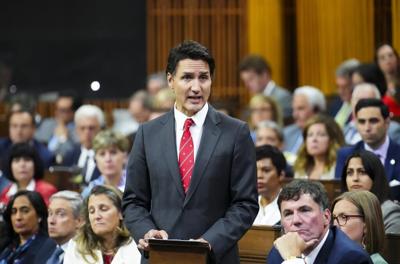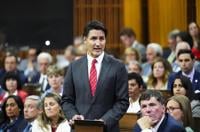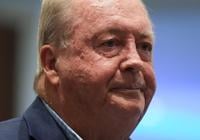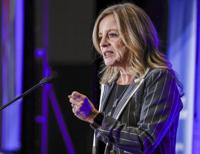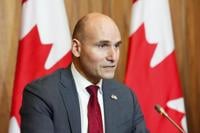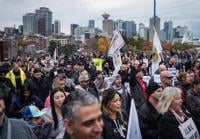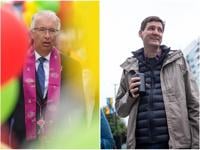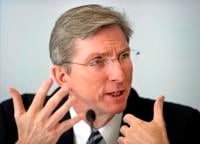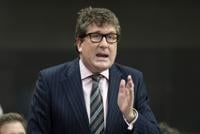OTTAWA - Senior diplomats have been ordered expelled in both Canada and India after Prime Minister Justin Trudeau linked agents of India's government to the shooting death of a Sikh leader near Vancouver.

Hardeep Singh Nijjarwas killed in the parking lot of his gurdwara in Surrey, B.C., on June 18. While Sikh community leaders in Canada have insisted the government of India was involved, police previously said they had not made any link to foreign interference.
But in a sombre address to the House of Commons Monday afternoon, Trudeau said there is credibility to the allegations.
"Over the past number of weeks, Canadian security agencies have been actively pursuing credible allegations of a potential link between agents of the government of India and the killing of a Canadian citizen," he said.
"Any involvement of a foreign government in the killing of a Canadian citizen on Canadian soil is an unacceptable violation of our sovereignty. It is contrary to the fundamental rules by which free, open and democratic societies conduct themselves."
He said he raised the issue directly with Indian Prime Minister Narendra Modi "in no uncertain terms" during the G20 Summit last week in New Delhi, and is demanding action.
"As you would expect, we've been working closely and co-ordinating with our allies on this very serious matter in the strongest possible terms. I continue to urge the government of India to co-operate with Canada to get to the bottom of this matter."
The office of Foreign Affairs Minister Mûˋlanie Joly said the envoy she deemed persona non grata Monday is Pavan Kumar Rai, whom her department lists in its public registry as a diplomatic agent based in Ottawa.
Joly said Rai is the Canadian head of New Delhi's Research and Analysis Wing, an intelligence agency, and that he has been ordered to leave Canada "as a consequence" of Ottawa wanting "India's full co-operation to make sure that we get to the bottom of this." She would not say whether India had been co-operative in any investigations.
India had issued an arrest warrant against Nijjar for his advocacy for a separate Sikh state in India's Punjab region, which activists call Khalistan. India has long maintained that these activists undermine national security, though Canada insists its citizens have freedom of speech if they don't incite violence.
The Indian government rejected allegations of involvement in Nijjar's death, calling them "absurd and motivated."
"Such unsubstantiated allegations seek to shift the focus from Khalistani terrorists and extremists, who have been provided shelter in Canada and continue to threaten India's sovereignty and territorial integrity," India's Ministry of External Affairs said in a statement.
"The inaction of the Canadian government on this matter has been a long-standing and continuing concern."
It then ordered the expulsion of an unnamed senior Canadian diplomat in a separate statement, saying the envoy is currently based in India and has been asked to leave the country in the next five days.
"The decision reflects Government of Indiaãs growing concern at the interference of Canadian diplomats in our internal matters and their involvement in anti-India activities," the statement said.
Police in B.C. said in a statement late Monday that they were aware of Trudeau's comments but were not in a position to discuss specifics about their investigation.
In June, investigators for the province's Integrated Homicide Investigation Team said they had not linked the shooting to foreign interference and there was no reason to believe the Sikh community in Canada was at risk.
IHIT has since said it is seeking two "heavy-set" gunmen who killed Nijjar as he sat in his pickup truck in the parking lot of Guru Nanak Sikh Gurdwara in Surrey where he was president. They are also seeking the driver of the suspected getaway car, a silver 2008 Toyota Camry.
The advocacy group Sikhs For Justice said Trudeau's statement backs up its concerns that India played a role in Nijjar's "assassination" because of his advocacy for Punjabi independence.
The group's U.S.-based lawyer, Gurpatwant Singh Pannun, has called for violence against India, in comments Joly had condemned in the past as unacceptable. The group on Monday urged the federal government to also expel India's High Commissioner to Canada, Sanjay Kumar Verma.
India's High Commission in Ottawa did not immediately respond to a request for comment.
The high commissioner has previouslyrejected the idea of his country's involvement in Nijjar's death, saying last month he wanted it "investigated to the fullest" by Canadian authorities.
"Those who have committed this grievous injury should be punished according to Canadian law," Verma said on Aug. 31 in an interview with üСÜꪤüýò¿Øéóæòêü.
"As a private individual, I felt hurt that a person was killed. And when I look at the reasons there could be many, and these reasons may not necessarily be only Khalistan-driven."
Moninder Singh, spokesman of the B.C. Sikh Gurdwara Council, said a public inquiry into Indian interference in Canada "needs to happen immediately."
"There's nothing that's actually stopping the government now from carrying this out. It would be interesting to know why they couldn't do it now," he said at a news conference Monday outside the Surrey gurdwara.
Singh said intelligence-sharing agreements between Canada and India put Sikh activists in Canada "at risk."
B.C. Premier David Eby issued a statement saying he had received a briefing by the Canadian Security Intelligence Service about the allegations made by Trudeau.
"I am deeply disturbed and angered by this information. Canadians across the country must be safe from the interference of foreign governments, including being targeted for threats or physical harm, including murder," he said.
"Our democracy depends on it."
Relations between Canada and India have been tense for months. In the last few weeks, Canada put trade talks with India on hiatus and cancelled a trade mission to the country that was planned for next month.
Trudeau had a 16-minute discussion with Modi at the conclusion of the G20 on Sept. 10, but arranging the meeting was more difficult than expected. India refused to confirm it would happen until almost the last minute.
During the summit, Trudeau had pushed a rule-of-law agenda which included waving a finger at Modi over foreign interference, skipping Modi's leader dinner and pulling his hand away from the Indian leader during a wreath-laying ceremony.
Trudeau was accompanied on the trip with his national security and intelligence adviser Jody Thomas, who revealed in June that India is among the top sources of foreign interference in Canada. Those comments came about two weeks before Nijjar was shot and killed.
NDP Leader Jagmeet Singh, who is himself Sikh, delivered an emotional statement in the House of Commons following Trudeau's remarks.
"What we've just learned today in the House is something that shocks the safety and security that so many Canadians rely on," he said.
"It is outrageous. It is shocking and it is going to have deep and devastating impacts."
Singh, who also spoke briefly in Punjabi, said he grew up hearing stories that challenging India's record on human rights might prevent activists from getting a visa to travel there.
"But to hear the prime minister of Canada corroborate a potential link between a murder of a Canadian citizen on Canadian soil by a foreign government is something I could never have imagined," Singh said.
He said people have come to Canada to be safe and free from violence and persecution.
"That safety and security that so many Canadians feel has now been rocked and has been shocked and has been destabilized."
Conservative Leader Pierre Poilievre said India needs to "act with utmost transparency" in the investigation.
"Because the truth must come out. We must know who performed the assassination, and who was behind the assassination," he said.
Leaders of all four recognized parties in the Commons called for Canadians to maintain peace and order.
"Let us remain calm and steadfast in our commitment to our democratic principles and our adherence to the rule of law," Trudeau said.
Joly said she would raise the issue with her peers in the G7 on Monday evening in New York City ahead of the United Nations General Assembly. She said Trudeau also raised the allegations with U.S. President Joe Biden in New Delhi last month.
She added that Canada is working to make sure Canadian diplomats in India are safe.
The news came the day a Quebec judge officially began her role leading a public inquiry into foreign interference in Canada.
Public Safety Minister Dominic LeBlanc said that Justice Marie-Josûˋe Hogue will have the leeway to look into Nijjar's death as part of her inquiry if she chooses.
"We have always said that foreign interference is not the unique purview of one country," LeBlanc said. "Hogue's terms of reference allow her to follow the evidence and to look at all the countries that are seeking to interfere in a way that's against Canadian law."
He noted that Thomas had made multiple visits to India in recent months to speak with officials about alleged foreign interference.
ã With files from Nono Shen in Surrey, B.C.
This report by üСÜꪤüýò¿Øéóæòêü was first published Sept. 18, 2023.
Note to readers: This is a corrected story. A previous version incorrectly spelled the first name of Hardeep Singh Nijjar.

